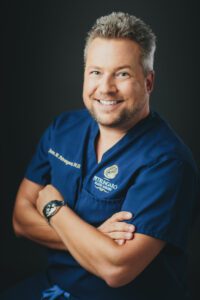The Expert Advantage: Why Only a Plastic Surgeon Should Handle Your Cosmetic Surgery

The Expert Advantage: Why Only a Plastic Surgeon Should Handle Your Cosmetic Surgery
Thinking about cosmetic surgery is an exciting and deeply personal step. You’ve done the research, set your goals, and are ready for a transformation. But when it comes time to choose a surgeon, you’ll encounter a dizzying array of titles: Cosmetic Surgeon, Aesthetic Doctor, and, of course, Plastic Surgeon.
This is arguably the most critical decision of your entire journey. It might surprise you to learn that in many places, any licensed doctor can legally perform cosmetic procedures, regardless of their training. This lack of regulation can be incredibly confusing and, more importantly, dangerous for patients.
In this informative guide, board-certified Plastic Surgeon Doctor Jason Petrungaro will break down the essential differences in training and certification and explain why choosing a physician who is board-certified in Plastic Surgery is not just a preference—it’s a prerequisite for the safest, most successful, and aesthetically pleasing outcome.
The Crucial Difference: Training and Certification
The core of this conversation lies in understanding what specific training a doctor has undergone after medical school. This is where the term “Plastic Surgeon” stands apart.
1. The Board-Certified Plastic Surgeon
A surgeon certified by the American Board of Plastic Surgery (ABPS) or its equivalent national board has completed the most rigorous and specialized training path available for cosmetic and reconstructive procedures.
What their training entails:
- Medical School (4 years): Completion of a Doctor of Medicine (M.D.) or Doctor of Osteopathic Medicine (D.O.) degree.
- Residency (6-8 years): This is the key difference. The surgeon completes a residency program that is entirely focused on plastic surgery, or a combined general surgery/plastic surgery residency. This training covers the entire body—head and neck, trunk, extremities—and encompasses two critical areas:
- Reconstructive Surgery: Treating traumatic injuries, birth defects, burns, and cancer defects. This training teaches complex tissue handling, wound healing, and how to manage the body’s response to surgery under challenging conditions.
- Cosmetic Surgery: Extensive, dedicated training in aesthetic procedures (breast augmentation, tummy tucks, facelifts, etc.).
- Certification: After residency, they must pass comprehensive oral and written examinations administered by the ABPS. They must also undergo continuous maintenance of certification, requiring ongoing education and peer review.
The takeaway: A board-certified Plastic Surgeon is a true surgical specialist. Their training ensures they not only know how to perform a procedure but, crucially, they know how to handle complex surgical scenarios and manage potential complications with the highest level of expertise.
2. The Cosmetic Surgeon / Aesthetic Doctor (Non-Plastic Surgeon)
The title “Cosmetic Surgeon” is often self-granted and can be legally used by doctors from virtually any background, including family medicine, gynecology, emergency medicine, or even dentistry.
What their training entails:
- Varying Backgrounds: They completed residency training in a field other than plastic surgery (e.g., Internal Medicine or OB/GYN).
- Weekend Courses/Fellowships: Their cosmetic surgery “training” typically comes from weekend courses, short-term workshops, or non-accredited cosmetic surgery fellowships lasting a few months.
- Lack of Broad Surgical Acumen: While they may be skilled in their original specialty (like diagnosing a disease or delivering a baby), they lack the 6-8 years of dedicated, comprehensive surgical training required to handle complex anatomy, manage massive soft-tissue flaps, or address significant complications that can arise from cosmetic surgery.
The takeaway: If a complication arises during or after the procedure (e.g., poor wound healing, tissue death, or a severe infection), a non-specialist often lacks the necessary surgical depth to perform the intricate corrective or reconstructive surgery required to save the result, or worse, the patient’s health.
The Risks of Choosing a Non-Specialist
When you choose a doctor who is not a board-certified Plastic Surgeon for a surgical procedure, you are accepting unnecessary risk in four major areas:
1. Safety and Complication Management
This is the most critical factor. Every surgery carries risks. For a board-certified Plastic Surgeon, managing complications is a core part of their training. They understand:
- Systemic Risks: How the procedure affects the entire body (anesthesia issues, blood clots, etc.).
- Local Risks: How to manage surgical site infections, hematomas (blood collections), seromas (fluid collections), and tissue necrosis (tissue death).
- Reconstructive Needs: They are trained to immediately pivot to a reconstructive plan if a serious complication threatens the patient’s health or limb. A non-specialist may have to refer the patient to a hospital emergency room, often necessitating a Plastic Surgeon to fix the problem they created.
2. Aesthetic Outcome and Artistry
Plastic Surgery is as much an art as it is a science. Dedicated training instills a nuanced understanding of:
- Anatomical Relationships: How a change in one area (e.g., breast size) affects the overall body contour.
- Tissue Dynamics: How skin, muscle, and fat will respond to tightening and repositioning long-term.
- Proportion and Harmony: The eye for balance, symmetry, and what constitutes a beautiful, natural-looking result on your specific frame. Non-specialists often lack this dedicated artistic training, leading to results that look unnatural or disproportionate.
3. Operating Facility Standards
Board-certified Plastic Surgeon Doctor Jason Petrungaro operates in accredited surgical facilities (like an AAAASF or AAAHC-accredited center). To maintain these accreditations, these facilities must meet stringent standards for equipment, sterility, staffing, and emergency protocols, ensuring the same level of safety found in a hospital operating room. Doctors who perform cosmetic surgery outside their field may operate in non-accredited, less-regulated office settings, compromising patient safety.
4. Limited Scope of Practice
A doctor who has only learned a few procedures in short courses will naturally limit their offerings to those few things they are comfortable with. This means they might push you toward the procedure they can do, rather than the procedure you need. A Plastic Surgeon can offer a wide range of options (e.g., recommending a breast lift with augmentation, rather than just augmentation) to truly meet your goals.
What Every Patient Should Do: Your Safety Checklist
Your job as a patient is to be an informed advocate for your own safety and results.
- Verify Board Certification:
- Go to the official website of the American Board of Plastic Surgery (ABPS) or the equivalent certifying body in your country.
- Search the surgeon’s name. The certificate should explicitly state “Plastic Surgery.” If it says: “Board-Certified in General Surgery,” “Dermatology,” or “Cosmetic Surgery” (which is often through a lesser, self-designated board), THEY ARE NOT A PLASTIC SURGEON.
- Ask About Hospital Privileges:
- A Plastic Surgeon should have hospital privileges to perform the exact procedures they offer in their office.
- Hospital privileges are a seal of approval: they mean other doctors and hospital credentialing committees have vetted the surgeon’s training and competence. A non-specialist often lacks these privileges for complex procedures.
- Inquire About the Operating Facility:
- Ask if the surgical facility is accredited by a recognized national organization (e.g., AAAASF, AAAHC). Do not settle for a non-accredited office-based setting for major surgery.
- Trust Your Instincts:
- If a doctor pressures you, offers an unusually low price that feels too good to be true, or minimizes the risks of the procedure, walk away. A true professional prioritizes patient education and safety above all else.
Q&A: Addressing Patient Concerns
1. What if a doctor is “Board-Certified in Cosmetic Surgery?”
Be cautious. “Cosmetic Surgery” boards (like the American Board of Cosmetic Surgery, or ABCS) are not recognized by the American Board of Medical Specialties (ABMS). Their training requirements are significantly less rigorous and shorter than those required by the ABPS, which is the gold standard for Plastic Surgery.
2. Can a non-Plastic Surgeon give me the same results for less money?
They might charge less, but the risk of a complication or a poor aesthetic result increases significantly. The cost of correcting a botched surgery (a revision surgery) far outweighs any initial savings. Choosing a board-certified Plastic Surgeon is an investment in safety and quality.
3. I want Botox and filler. Do I need a Plastic Surgeon for that?
For non-surgical treatments like Botox, fillers, or non-invasive lasers, a dermatologist, Plastic Surgeon, or other highly trained provider (like a Registered Nurse or Physician Assistant) who works under the direct supervision of a board-certified specialist is acceptable. However, having the oversight of a Plastic Surgeon ensures a deep understanding of facial anatomy and complication management.
4. Are all Plastic Surgeons automatically board-certified?
No. Always verify. The term “Plastic Surgeon” is legally protected in many places, meaning only those who complete the specialized residency can use it. However, always confirm they have passed their exams and are certified by the ABPS to ensure they have the highest level of competence.
5. What is the most dangerous scenario in choosing a non-specialist?
The most dangerous scenario is undergoing a major, complex surgery (like a tummy tuck or a large-volume liposuction) in a non-accredited office setting with a non-specialist. If the patient has a severe complication—such as a blood clot, an anesthetic crisis, or significant blood loss—the doctor and facility may lack the necessary resources and training to stabilize the patient, resulting in a potentially tragic outcome.





